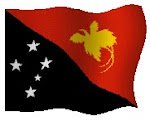I found this interesting explanation in the Masalai blogsite http//www.masalai.wordpress.com
by Paul on the aid issue.
by Paul on the aid issue.
" The crux of the overseas aid problem appears at first to be
hopelessly complex and difficult to understand. However maybe this is
not really so. All one has to do is to break the problem down into the
composite parts.
Firstly, why are there any overseas aid programs anyway? Here are a few reasons:
1. Influence – obtaining prestige on the world stage – PM Rudd
(previous diplomat) is currently trying to achieve this by upping the
aid program to gain acceptance and an ego trip on the world diplomatic
stage. His last attempt to do this with the Copenhagen conference of
climate change flew like a proverbial lead zeppelin. Hence he is now
flying the overseas aid flag to try and get African states to assist in
him getting a temporary seat on the UN Security Council. Who cares?
Very few Australians that’s for sure. Yet the PNG PM is saying that his country will be a donor country. Go figure, as the ‘skeptics’ say.
2. National Security and Economic Gain – Humankind is very
predictable and as each civilisation expands it seeks to excludes others
who are in competition with it. This contest may be by open warfare but
is usually carried out using economic influence and will include
competition for natural resources. Look at the mining and timber
industries in PNG as examples. Aid programs are often tailored with
this aspect in mind.
3. Guilt – Some leaders of some less developed countries have
perfected a very useful method of extracting free money from those
developed countries who are considered ‘fair game’. This gives rise to
the scenario where the erudite African despot and his secret police are
living very well off the aid sent by donor countries who are appalled
by the conditions in the despot’s country and want to help. With no
freedom of the press and repressive policing, no one except the
dictator really knows what goes on in his country and the aid program
pays for the PR team (usually made up of overseas consultants who must
keep the money rolling in to be paid, and therefore in order to keep
the status quo going. Of course, this would never happen in PNG would
it?
4. Genuine concern – The high moral ground must be taken by the NGO
and Church groups who actually do achieve something, usually with very
limited funding and volunteer staff. Not all missions in PNG are useful
and some missionaries can be most unhelpful based on my direct
observation.
5. Demand – Less developed countries are often lured into accepting
aid money as a practical way of becoming more developed. This is a myth
and almost every country that has become developed has done so without
overseas aid assistance. What has overseas aid to PNG achieved over the
last 35 years?
So what yardstick do you use to evaluate the aid program? Surely
that should be assessed in long term benefits to the country receiving
the aid? Wrong! Why? Because the donor countries get wound up in a
never ending cycle of continually giving more because the very aid they
give makes those receiving it more and more dependent."












0 comments:
Post a Comment